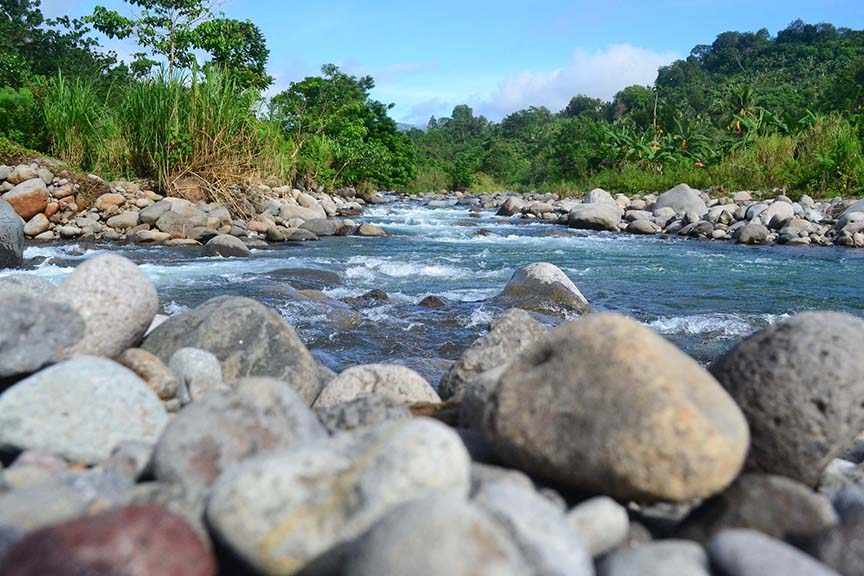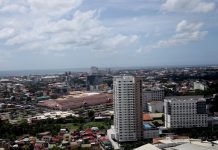(Editor’s Note: Investors are so bullish about Davao City that big-ticket projects costing billions of pesos are popping up in just about any part of the city like mushrooms after a heavy downpour, to resurrect a tired idiom. The following article describes just four of the countless giant projects picked at random by Edge Davao editor Jimmy K. Laking and senior reporter Alexander D. Lopez. Here they are.)
P2.5-B LANANG PREMIER DOCTORS HOSPITAL
The incorporation of ‘green architecture’ by the P2.5-billion Lanang Premiere Doctors Hospital, Inc. is certain to create shockwaves for Davao City in the years ahead.
Not only has it raised several notches higher the concept of medical facility, it has also announced itself ready to take on the ever expanding BIMP-EAGA market.
It is a class act for it is rare to see how a ‘green hospital’ shapes up compared to the ‘traditionals.’
Chief architect Rafael O. Tayactac said going green will ensure that positioning of the hospital rooms will not be hit directly by sunlight.
The windows will be set up in a way to enable natural ventilation. Solar panels will be used for power. Recycling sewage plans using restroom wastewaters will be installed.
Topping these is a chilled water system to cool the whole facility.
The architect said the ultra-modern hospital will be built using resources that will equitably meet the developmental and environmental needs of the present and future generations.
LPDHI chair and chief executive officer Lemuel Podador said the decision to use green architecture is for sustainability reasons.
This is because while the equipment is costly initially, it is expected to redound to lower operational cost in the long run.
More than this, future occupants of LPDHI will benefit from improved indoor environmental quality, resulting in higher productivity and better comfort.
Among other things, the 12-story, 250-bed facility is aimed to make medical care affordable to the people.
It will be a prize catch in the BIMP-EAGA in so far as medical tourism is concerned.
MODERN SPORTS COMPLEX IN MINTAL
Come 2019, the City of Davao will be more than prepared to host the 2019 Palarong Pambansa.
The reason for this optimism is an emerging sports complex within the University of the Philippines campus in barangay Mintal.
The story began in 2015 when UP president Alfredo Pascual ceded off to Davao City part of the campus for the construction of a sports complex.
Then Rep. Isidro Ungab managed to allocate P450 million from the general appropriations as initial funding to see the project realized. Eventually, the congressman also managed to allocate in the 2016 budget the amount needed to build an Olympic-size swimming pool.
“It is a dream come true by the Grace of God,” said Congressman Ungab, adding that it has been a dream since 1996.
The P50-million football stadium, also funded under the 2016 general appropriations act, will have a 30,000-seating capacity when completed, following Fifa rules.
An Aquatics center has also been incorporated.
William “Butch” Ramirez, chairman of the Philippine Sports Commission said that with the sports complex, Davao City will become a sports Mecca in Mindanao.

Increasing Davao’s potable water supply
Enough supply of potable water is among the considerations that investors examine before pouring in their resources.
Davao City is among the top destinations nowadays in the country for trade, business and investments.
Sourcing out of potable water for upcoming investments in the city is nearing fulfillment as Apo Agua Infrastructura, Inc. is going full swing in its preparatory operations that will include pre-construction works by the middle of this year.
“Acquisitions of permits are almost complete and by the middle of this year Apo Agua will proceed with its preconstruction operations,” said Cirilo C. Almario III, general manager of Apo Agua.
The company will undertake most of the P12-billion Davao City Bulk Water Supply Project of the Davao City Water District (DCWD).
The project will tap surface water of Tamugan River. The works will include the construction of weir and intake structure, raw water transmission lines, water treatment plant, hydroelectric power plant and treated water transmission lines.
Apo Agua is investing P10 billion to complete the construction works while the DCWD is pouring some P2 billion for the laying of new giant pipes from its reservoirs down to its distribution lines in various areas of Davao City.
Apo Agua is a joint venture of Aboitiz Equity Ventures (70 percent) and JV Angeles Construction Corporation (30 percent).
The joint venture had already signed a Bulk Water Purchase Agreement with the DCWD to provide 300 million liters per day (300 MLD) of potable water in a period of 30 years to DCWD consumers in Davao City.
DCWD is currently dependent on ground water sources tapped through electric-powered pumps – a system that Almario described as expensive and can be affected during power interruptions.
Reports said that DCWD spends close to P400 million in electric bills annually in pumping out water from the Dumoy aquifers, an amount that can be saved once the bulk water project starts.
Davao City is growing fast as investments are pouring in since last year and the demands for potable water also increase.
Apo Agua offers more sustainable option to source out potable water for Davao City as its main source, the Tamugan River, regularly registers a 12 cu.m./sec water flow, a volume enough to supply the number of liters of water stipulated in the agreement.
The project, Almario said will start from the construction of a weir in Barangay Tawantawan. A weir is a low dam that will be built across Tamugan River to raise the level of water for its diversion towards an intake facility and the water treatment plant.
Strong flows of waters from the weir down to the intake facility will also be utilized to operate a 2MW hydroelectric power plant that will energize the water treatment plant.
“The project will have its own source of power via a hydroelectric plant that will be utilized in the process of treating the sourced out water before releasing it towards the reservoirs of DCWD,” Almario said.
A total of eight reservoirs of DCWD will be served by Apo Agua – to include the reservoirs in Calinan, Tugbok, Talandang, Mandug, Panorama, Panacan, Indangan and Cabantian.
Full project construction will commence by the last quarter of this year until its target completion by 2019.
“Only a few documents are permits are being processed right now. Upon completion of these permits by June or July, we will immediately proceed with the pre-construction works and full construction work of the project,” Almario pointed out.
The project Environmental Compliance Certificate from the Department of Environment and Natural Resources was already approved last week.
This March, it is expected that the Sangguniang Panlungsod of Davao City will compete its two public hearings while the City Planning and Development Office has already endorsed the application of Apo Agua to the Davao City Local Zoning Board.
Permits and certifications from the Department of Agriculture and the Department of Agrarian Reform are also being processed and expected to be completed by June of this year.
“We are optimistic that all the requirements will be completed by mid 2017. This project is very important as this will solve the problems of DCWD,” Almario said.
The project, he added, will allow service coverage of DCWD to expand to address the non-covered demands and provide the consumers with high-quality treated water.
Tire factory soon
The Department of Agriculture recently inked a memorandum of understanding with the Philippine Rubber Farmers Association and the Phoenix Petroleum Philippines Inc. for an ambitious local tire manufacturing venture.
Davao City is among the areas being considered where the proposed P1-billion tire factory will be established.
Under the MOU, the signatories agreed to invest and set-up the Philippine Agila Tire Manufacturing.
Agriculture secretary Manny Piñol said the proposed factory will be a big boost to the rubber farmers in the country.
Piñol added that the agriculture department will provide support to the preparatory activities that will be conducted in line with the establishment of PATM.
President Duterte and Secretary Ramon Lopez of the Department of Trade and Industry witnessed the signing of the MOU. (By Jimmy K. Laking & Alexander D. Lopez)




